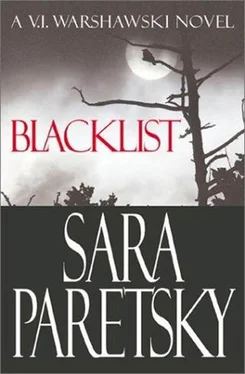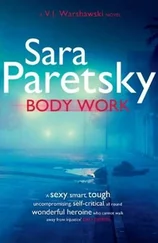Strictly speaking, whether Catherine was lying or not about her grandfather was none of my business. The only thing about her that could remotely justify my scrutiny was whether she had known Marcus Whitby. And I thought she hadn’t. She wasn’t yet a sophisticated liar-her breathless manner when she was twirling away from the truth would disappear with practice.
That farrago she’d spun about her grandfather and Larchmont was truly infuriating, but I thought she was merely oblivious to Marcus Whitby. Hers was an adolescent absorption in her own affairs; it was so intense that she brushed off the dreadful notion of Whitby lying dead in the pool while she went about her own separate business. I don’t usually believe in coincidences, but Whitby and Catherine-and me-all being there on the same night could actually be one.
She was frustrating enough for me to want to find out what she was doing at Larchmont Hall. But I couldn’t ask Harriet Whitby to pay me to pursue a teenager for no reason except that she’d made me feel foolish.
I switched on the radio to see if they had anything on Olin Taverner’s death. More bombing runs outside Kandahar, dissension among the Afghan warlords, Illinois cutting funds for schools and health care to balance the state budget. Since September 11, just about every public figure in America has been declaiming that we’re a Christian nation; I guess that’s why widows and orphans carry the load for fiscal responsibility here.
During the interminable commercial breaks, I began to doze, but I jerked back awake at Taverner’s name.
One of Chicago’s most prominent figures, and one of its most controversial, is gone. Olin Tavernergained notoriety in the fifties when he served as counsel to Illinois congressman Walker Bushnell on the House Un-American Activities Committee. For two decades, Taverner was one of the most important voices of American conservatism. Of late years, he had been living quietly, almost reclusively, in a retirement home near Naperville. His personal attendant found Taverner in his armchair this morning, dead of an apparent heart attack. He has left no immediate survivors. Again, Olin Taverner, dead at ninety-one.
Are you sick of turning to your ten-year-old every time you want to cruise the Web? Well, here’s a perfect solution. I switched off the sound. Dead in a retirement home near Naperville? Could that have been Anodyne Park? Maybe Taverner had been Geraldine Graham’s neighbor in that exclusive little retirement resort. Maybe I could talk to her about him. And find out whether by some remote chance Catherine Bayard was telling the truth when she said her grandfather had a key to Larchmont Hall.
A Chicago cop started purposefully down the street, ready to give me a second ticket. I put the car in gear and drove to my office. I should check a few things, anyway, before seeing Ms. Graham again. Come to think of it, I could get a detailed report on Taverner from the Web.
As I let myself into the building, Tessa was locking her studio door. She
backed away from me when she saw I had a cold: she’s a bit of a nut about germs. I made a show of covering my mouth with my scarf. She laughed, but still edged quickly out the front door.
I went down the hall to the back of the building, switching on the tiny cooktop we put back there. We share a shower room and a refrigerator, too, but we meter our gas and electricity separately because Tessa’s metal sculpting is so power-demanding. I scrounged one of Tessa’s tea bags, conscientiously leaving an IOU: one ginger-lemongrass tea bag, and took it into my office.
On an impulse, while my system came up, I phoned Morrell’s editor in New York. Don Strzepek and Morrell had known each other for years, since their Peace Corps days in Jordan, and I hoped Don might know what Morrell was up to. When I only reached his voice mail, I didn’t bother to leave a message.
I wanted a human voice. I wanted Morrell. E-mail is too remote. A traditional letter has more intimacy-you can hold the paper that someone else touched, but with e-mail, you type and send but never touch or hear. Morrell himself was beginning to seem so distant it was hard for me to feel that he was real. I studied the photo I had on my desk, his wiry curly hair, his thin face, the mouth that had kissed me, but I couldn’t summon his voice or the touch of his long fingers.
Ulysses chose his path, Penelope: don’t let that control you, I adjured myself sternly. “Don’t weep over yourself,” my mother had told me-I was eight or nine, and wrapped in misery because the girls I usually played with had gone to a birthday party I wasn’t invited to-“Do something.” That afternoon she’d abandoned dinner preparations and let me play dress-up in her concert gown, weaving an improbable story for me as Signora Vittoria della Cielo e Terra. Today I began searching the Web for stories about Calvin Bayard. Maybe I could find out why no one was allowed to talk to him. Or had Renee been spinning me a line?
When my Web search brought me the Bayard phone number, I called out to the New Solway estate, and my heart beat a little faster: What if I did get through to him? What would I say to my hero?
When a woman answered, I said I was one of Calvin’s old interns. “I’m in town this week; it would mean a lot to get to see him.”
“He isn’t scheduling that kind of appointment now,” the woman said in a deep rough voice.
“I’d settle for a chance to say hello on the phone,” I wheedled.
He couldn’t come to the phone. There wasn’t a good time to call back. I should try Mrs. Bayard at the company number if I had business with the Bayards. Her good-bye was truncated by the clicking of the handset.
So what was going on? If he was sick, why didn’t they just say so? Something about New Solway made me imagine Gothic scenarios: Calvin was dead, and to keep control of the company, Renee had organized a massive conspiracy to make the world think her husband was still alive. Calvin’s embalmed body lay in a giant freezer in the estate’s old icehouse. Marc had found it there, and Renee had murdered him.
Making things up was more fun than research, but research gets the job done. I started reading news stories on Nexis, hoping to find out when Calvin had last been seen in public. Five years ago, he’d stepped down from formal leadership of Bayard Publishing and Renee had assumed the CEO spot. The Herald-Star and the New York Times both did big stories on it. Industry scuttlebutt said she’d been in charge for a good four years already.
That was all the Web could tell me. Calvin hadn’t been at charity balls or any other public event, at least not any reported in the press, since his retirement. To find out anything more, I needed to do old-fashioned legwork, talk to friends and neighbors. For which Darraugh would definitely not pay me. Although come to think of it, he probably knew-that would be an easy question to slip in when we next spoke.
When I switched my search to Olin Taverner, I picked up a slew of hits. I chose the National Public Radio report, which had the advantage of being something I could absorb with my eyes shut. I logged onto a real-time player and leaned back to listen to the report.
Taverner had died in Anodyne Park-but he had grown up in New Solway. So not only were he and Calvin Bayard old enemies, they must have been old playmates; they were roughly the same age, after all. They used to gallop around New Solway on their ponies together or knout the servants, or whatever it is that very rich children do to amuse themselves.
Perhaps Marcus Whitby had been on his way to see Taverner when death stopped for him. I was getting up to find my detail map of the area, to see if there was a way for a man going on foot to Anodyne Park to end up in Larchmont’s pool, when the Bayard name arrested my attention again.
Читать дальше












